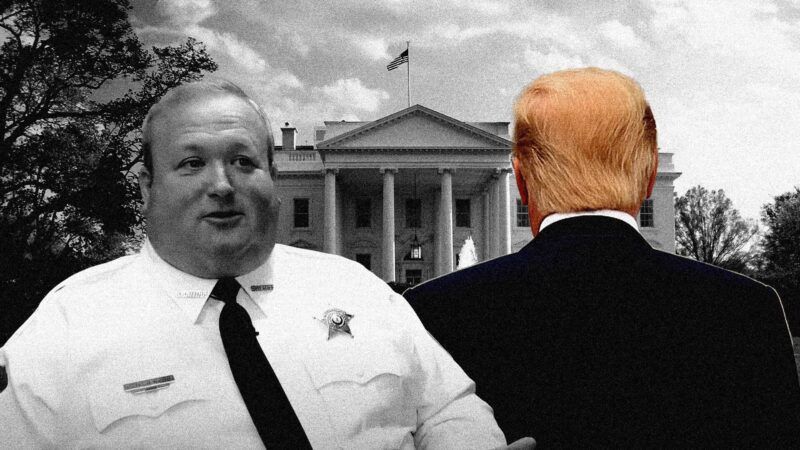Trump's Pardon for Former Virginia Sheriff Who Exchanged Badges for Cash Makes a Mockery of 'Law and Order'
Scott Jenkins was convicted of engaging in cartoonish levels of corruption. If the rule of law only applies to the little guy, then it isn't worth much.

"We must maintain law and order at the highest level, or we will cease to have a country, 100 percent," said Donald Trump, then a candidate for president, at a 2016 rally in Virginia Beach. "We will cease to have a country. I am the law and order candidate."
It's a theme that would continue for nearly a decade, up to the present day. "We have to get law and order back," he said in April 2024, during his third campaign for the presidency. "We have to bring law and order back to our cities, back to our country, and we're doing it," he told a crowd in August of that same year. "But when I get back into the Oval Office," he said the following month, "the madness ends, and the law and order is going to return to our country."
If the full, unconditional pardon now-President Trump recently gave to disgraced ex-Sheriff Scott Jenkins is any indication, then the madness unfortunately has not ended.
Jenkins, formerly of the Culpeper County Sheriff's Office, was convicted last year of accepting over $75,000 in cash bribes from several businessmen in exchange for Jenkins appointing them as auxiliary deputy sheriffs, a sworn law enforcement position. He did not train or vet them; for their money, Jenkins gave the bribers badges and credentials, which recipients used in interesting ways, like to get out of traffic tickets and obtain other special privileges.
"Sheriff Scott Jenkins, his wife Patricia, and their family have been dragged through HELL by a Corrupt and Weaponized Biden DOJ," Trump posted on TruthSocial in announcing the pardon. He added that Jenkins allegedly wanted to offer additional evidence in his defense during trial, but the judge "refused to allow it, shut him down, and then went on a tirade."
The Office of the Pardon Attorney did not respond to a request for comment clarifying what that was, but a judge improperly blocking exculpatory evidence is an issue for an appeal, not a pardon. In any case, the evidence against Jenkins was, by every measure, overwhelming. Rick Rahim, a convicted felon, testified that he bribed Jenkins with $25,000 in cash and an additional loan (which was never repaid) so he could be sworn in as an auxiliary deputy. One video shows Jenkins accepting a $5,000 check from a businessman and then adding, "I'm going to make it official with a badge." Another photo presented at trial shows Jenkins holding a gift bag; a recording caught businessman Kevin Rychlik, an associate of Jenkins, saying, "You have cash from him in the bag." Two undercover law enforcement officers also testified that Jenkins accepted bribes from them in exchange for being deputized.
A jury in December found Jenkins guilty on 12 counts: one count of conspiracy, four counts of honest services fraud, and seven counts of bribery. He was sentenced to 10 years in prison.
To argue that a pardon here is in service of "law and order"—as opposed to a rejection of it—is to pervert the meaning of that term at a fundamental level. Law and order is vital to a functioning society. If it stands for anything, it cannot exempt the very people who are charged with its application. If the rule of law only applies to the little guy, then it isn't worth much. "With great power comes no responsibility" is not a phrase that has gained much traction throughout the ages for its wisdom.
So why pardon Jenkins, particularly when considering the stated justification—that he couldn't offer a certain piece of evidence in his defense—strains credulity? "No MAGA left behind," Pardon Attorney Ed Martin, whose nomination for U.S. Attorney for the District of Columbia recently failed to attract enough support in the Senate, said Monday on X. "Thank you, @potus Trump, for pardoning Sheriff Jenkins!"
In a recent conversation on The Reason Interview With Nick Gillespie, New York University law professor Rachel Barkow, who is an expert on the pardon power, told me that it is "only as good as the people who exercise it." Former President Joe Biden's pardons for his extended family, Anthony Fauci, and others received a great deal of criticism—including in Reason and from me—for undermining the rule of law. That remains true. And it underscores the fact that Trump cannot distinguish himself from his predecessor here, after making clear that someone responsible for enforcing the law may be free to violate it, so long as he is in the president's good graces.


Show Comments (109)